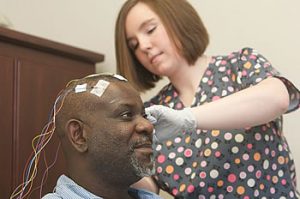Sleep center hopes to help people wake up refreshed
GREENVILLE, N.C. — Tony Worthington wants to get a few good winks.”I didn’t sleep too well last night,” he said. That was as he slid under the covers one February night at the new Sleep Disorders Center at East Carolina University.
Physicians at the center aim to help people get sufficient sleep and avoid acute and chronic conditions related to sleep disorders.

Tony Worthington is prepared for his sleep study by technologist Michelle McLawhorn. Photo by Cliff Hollis
“If you can’t sleep, that’s a problem,” said Dr. Sunil Sharma, medical director at the center, a board-certified sleep specialist and an assistant professor in the division of pulmonary and critical care medicine at the Brody School of Medicine. “If you sleep too much, that’s a problem.”
The center is inside Moye Medical Center at 521 Moye Blvd. across from the Brody Medical Sciences Building in Greenville. March 1-8 is National Sleep Awareness Week.
Sleep disorders are common, according to Sharma. Five percent of the population has obstructive sleep apnea, in which people stop breathing for as long as a minute up to hundreds of times each night. The immediate result is their sleep is interrupted and they feel tired during the day. Long-term consequences include heart disease, high blood pressure and more. Sleep apnea can also induce seizures and can be fatal.
“Research has shown that individuals with sleep apnea are at an increased risk for heart attack and stroke, with the risk for stroke quadrupling,” Sharma said. “Sleep apnea may also play a role in metabolic syndrome and diabetes by increasing insulin resistance. Sleep apnea also causes excessive daytime sleepiness and cognitive changes, which may significantly impact quality of life of patients.
“Fifty percent of patients with atrial fibrillation and congestive heart failure have sleep apnea,” Sharma said. “It’s not just coincidence. There’s a direct link.”
Getting a diagnosis for his poor sleeping is what brought Worthington to ECU. His wife, a nurse, told him he snored and worried that he quit breathing during the night – a symptom of sleep apnea. Worthington recalled that the death of football star Reggie White was linked to obstructive sleep apnea and decided to take his wife’s advice to see a doctor.
“I told her once I turned 50, I’d check it out,” Worthington said. “I didn’t pay it no mind. You know how we (men) are. Anything that can make you better at 50, there’s nothing wrong with that.”
Worthington’s situation is typical. “Most of the time, this disorder is brought to our attention by the spouse,” Sharma said. “The wife or husband drags the spouse in and says, ‘I’m scared to sleep with this guy,'” fearful the breathing won’t resume or it will lead to sudden cardiac death.
The sleep center’s rooms are similar to a typical bedroom and not at all like a clinic or hospital room.
“It’s important for us that patients feel comfortable,” Sharma said. “You have to remember if the patient does not sleep, we don’t get the diagnosis, so it’s imperative the patient falls asleep.”
In a typical outpatient sleep study, called polysomnography, the patient spends the night at the sleep center. Technologists place sensors on various sites on the head and body to record brain waves, muscle activity, limb movements, heartbeat, breathing and oxygen saturation during the night. A physician with special training in sleep medicine, such as Sharma, interprets the test results and develops a treatment plan with the patient.
Worthington’s study showed he has sleep-disordered breathing. He will undergo further studies to help doctors devise a treatment plan.
In addition to sleep apnea, physicians at the center can evaluate and manage other sleep disorders such as obesity hypoventilation syndrome, insomnia, narcolepsy, parasomnias (abnormal movements, behaviors, emotions, perceptions and dreams), restless leg syndrome and REM behavior disorders. The center also treats sleep disorders in children.
Sharma emphasizes that proper sleep does not always come naturally, and people shouldn’t hesitate to seek help.
“Sleep is an active process,” he said. “It’s not passive as people think. You really have to work hard. (In) very few people does sleep come automatically.”
Sleep studies are done nightly Monday through Thursday. Initial and follow-up clinic appointments are held on Tuesdays and Thursdays. For more information or to schedule an appointment, call 252-744-1712.